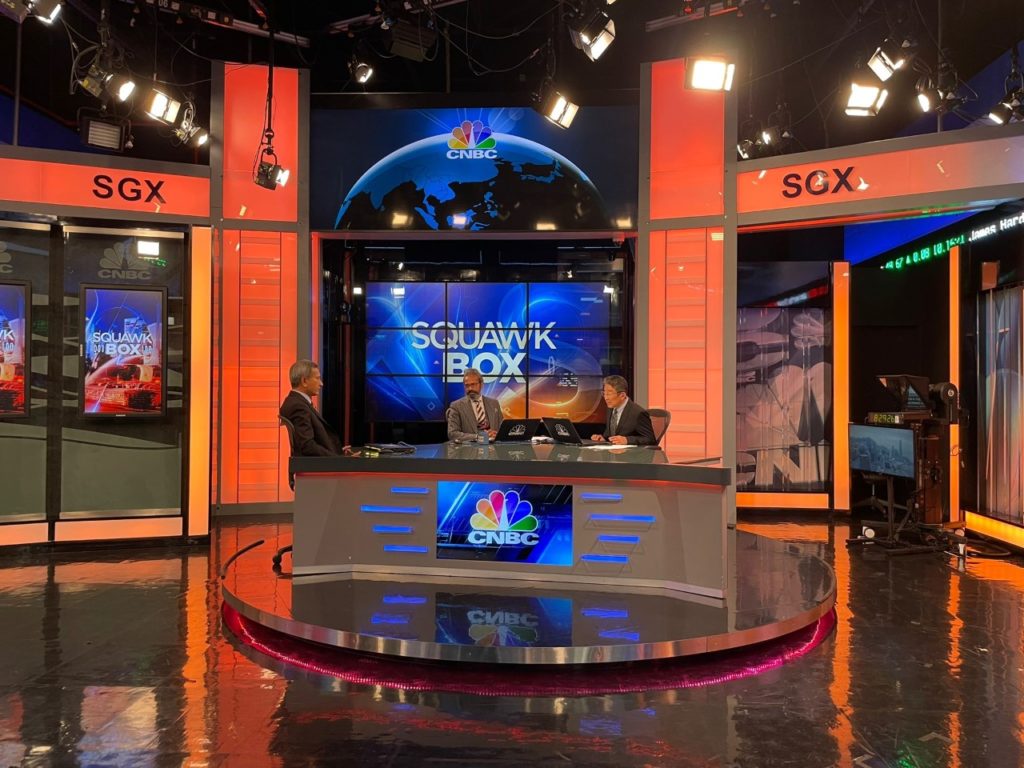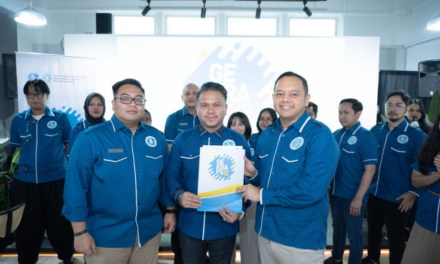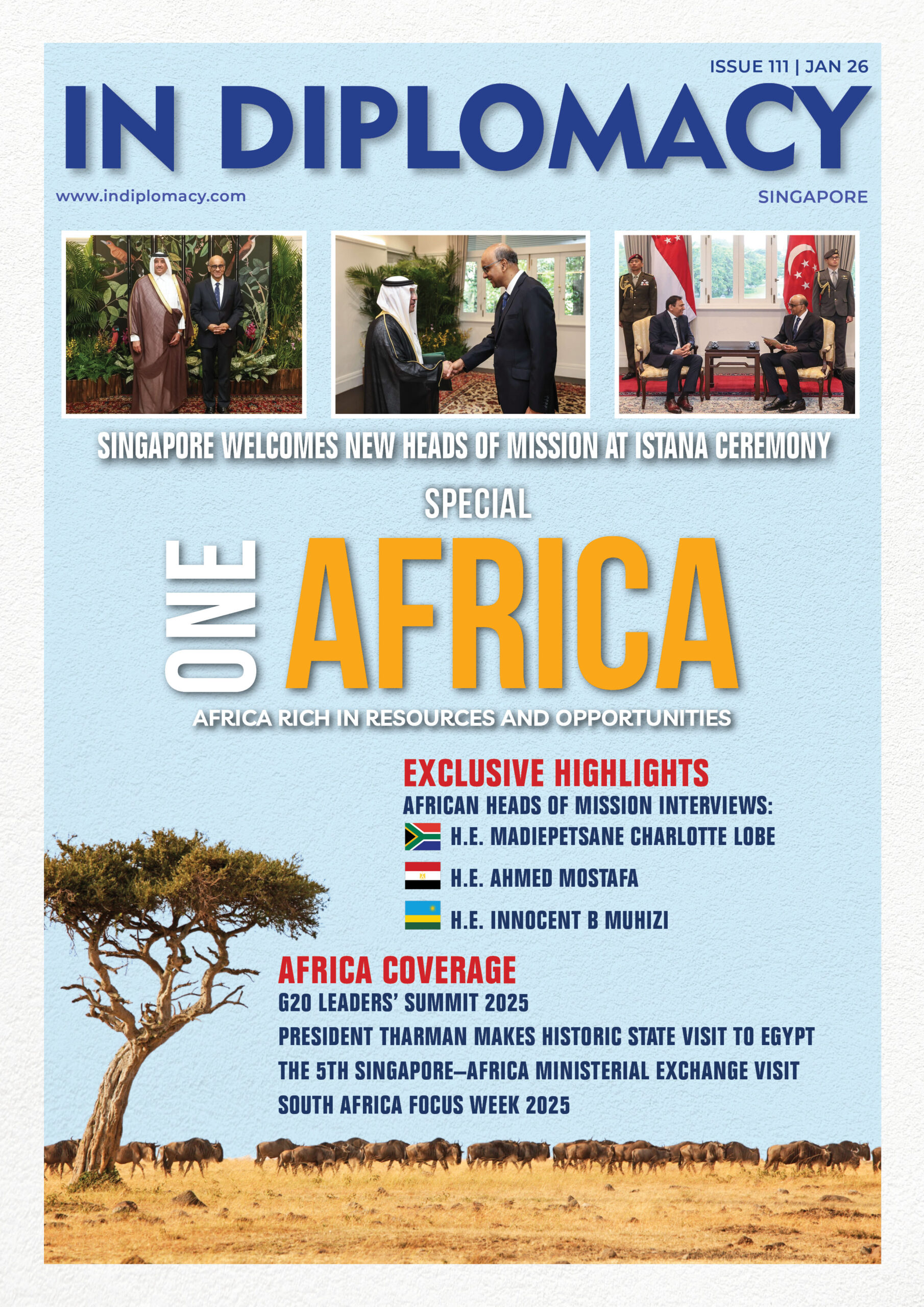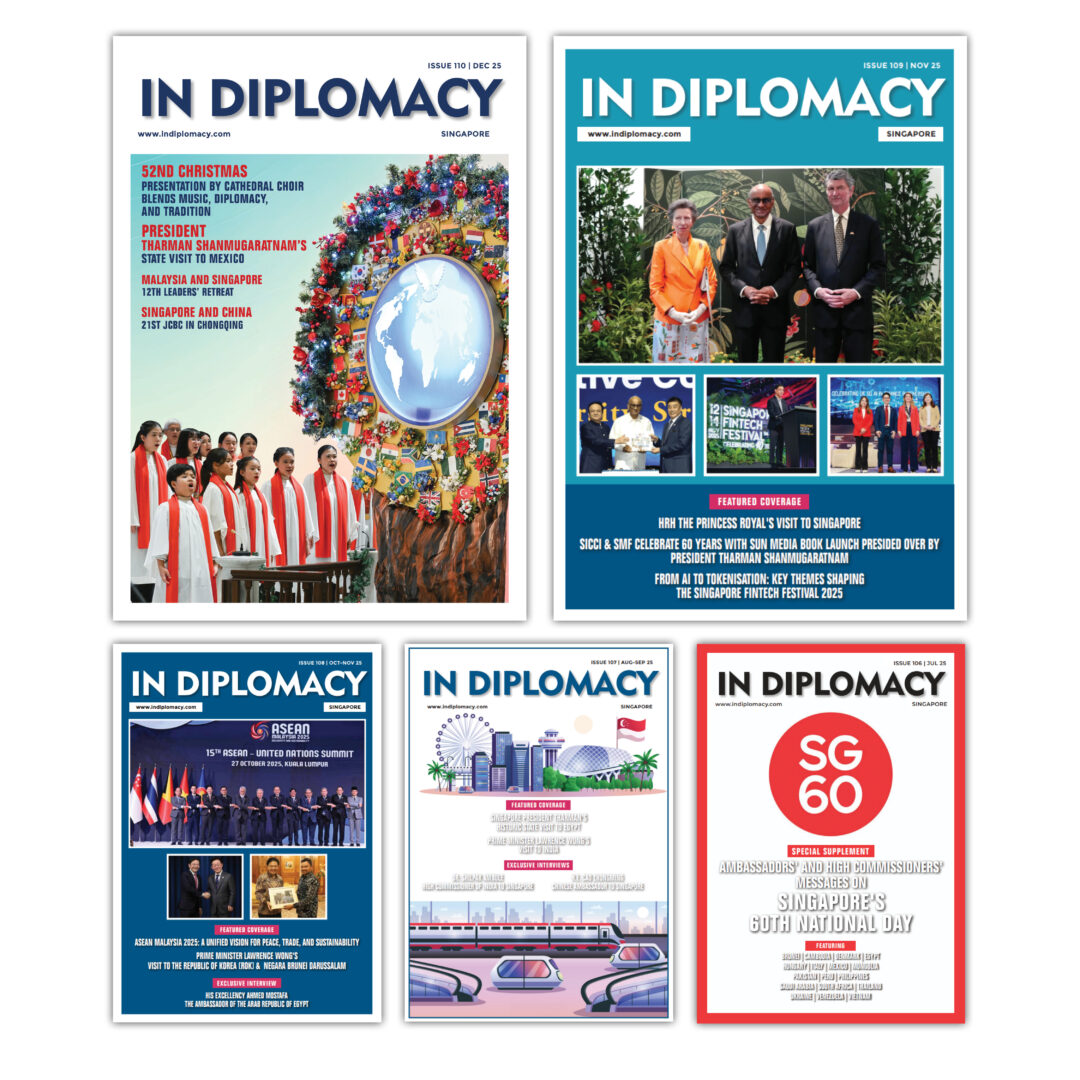
Martin Soong (CNBC Asia): November, the month that just was, was a busy one for diplomacy. Starting with COP27, the climate Summit in Sharm El-Sheikh, Egypt, followed by the APEC (Asia-Pacific Economic Cooperation), as well as the (40th and 41st) ASEAN Summits. Then, we had the G20 Summit in Bali, Indonesia, which for a lot of people grabbed the spotlight because that was where US President (Joe) Biden and Chinese President Xi Jinping met face-to-face at what some described as a conciliatory meeting. Joining us today is somebody who has had a good vantage point at pretty much all of these gatherings – Dr. Vivian Balakrishnan, Singapore’s Minister for Foreign Affairs. He joins Sri (Jegarajah) and I here at the SGX for a CNBC exclusive interview. Minister, good morning, great to see you. Welcome back.
Minister: Good morning. Great to be back.
Soong: How are you? You are back from on the road, right?
Minister: Yes, I have been. It has been a whirlwind. The diplomatic calendar is full. The key point is full resumption, full service, face to face. That is good. That is essential.
Soong: So, G20. I know you were in Bali, and we were there as well. And Sri was over at Bangkok at the APEC Summit, which we will get to in just a bit. The Biden-Xi meeting, how important was that?
Minister: That was critical. I think the whole world was watching. Would they meet? How would that meeting go? The way I would describe it is that it was necessary, first, to establish a floor to the relationship because, quite frankly, the relationship has been sliding down (in the) last couple of years, no doubt about that. (A) face-to-face meeting between two men who actually know each other well, have a certain reservoir of goodwill and candour – that was very, very useful. That was something which we all were looking forward to and (were) glad it occurred. The other point I would add, is that it in a sense, allowed both sides to telegraph what they call their red lines and bottom lines. That is absolutely essential, and it is no accident that after that, you see a flurry of meetings occurring at the ministerial, secretarial and working level.
Soong: Yes, understood. Singapore’s Ministry of Foreign Affairs is almost famed for the quality of the people, right? I am not so sure, and I am saying this as an American, that the same can be said of the State Department right now, because it has been hollowed out over several years. At the working level, the teams that are meeting across all the areas of friction in the US China relationship – China, obviously is not short of people or expertise –What about the US side? Does that concern you?
Minister: The US side, I know well from direct interactions. There is no question about the high quality. These are experienced, seasoned diplomats; people who have been thinking through issues for years even when they were out of office. I have no reservations or doubts about the quality of diplomacy.
Soong: Minister, to what degree, did the face-to-face and very constructive first step meeting between Xi Jinping and President Biden de-risk US-China relations as it applies to the trade and commerce sphere? And as it applies to the geopolitics and Taiwan specifically for our region?
Minister: I think de-risk may be overstating the case. This is just the first round. As I said, bottom lines and red lines. The risk factors, the strategic misalignment is still there. On China’s side, they worry about an America that is unable to cope with, for the first time ever, a historical strategic competitor. And they worry that America is trying, by all means possible, to contain or to suppress. On the American side, a significant train of thought is that China has unfairly and perhaps coercively, taken advantage of globalisation. They are starting from two almost mutually non-reconcilable perspectives. And there is still a long way to go. But as I said, bottom lines, red lines, are important so you do not inadvertently stumble into conflict. It is just the beginning.
Soong: The Xi-Biden meeting and talks overshadowed the still very important work of the G20 on critical issues like the energy crisis, energy inflation, as well as food inflation. But we did have a little bit of movement, and finally, a conclusion in terms of the Black Sea Grain access, as well as just a couple of days ago, the price cap on Russian oil. How optimistic are you that both of these are going to work specifically to help energy as well as food inflation in Singapore?
Minister: Let us deal first with the grain deal. For that, I really want to give full credit to António Guterres, the Secretary-General (of the United Nations). We (have) met him, obviously, and every time I bumped into him or met him, he was on the phone and I knew there was only one topic on his mind – and it was negotiating the grain deal. I give him full credit for that deal. I think it is important that that gets done, because actually, the grain is there. Those granaries are full, and for it not to get out to the parts of the world – especially in Africa – it is a crime. I really want to give full credit to António Guterres for that.
On the oil price cap, I have to confess to being a bit more sceptical. If you look at Brent spot price, it must be in the low 80s (USD). If you look at the Ural spot price, I think it is in the low 60s (USD). An oil price cap of 60 (USD), it is arguable how much impact it will have on the market. I think the real driver for oil prices is what is happening in China, and the announcements that I expect they would make shortly.
Soong: Okay, any insight? We had sort of the 20 points a few weeks ago, now we are hearing a lot of chatter reports that come tomorrow – Wednesday – there could be further 10 points added on to that to reflect even further easing of restrictions.
Minister: I do not have any privileged insight into what is happening in Beijing. But let us take a step back. The Omicron variant is highly contagious – we know about that, we faced it – but fortunately, less virulent. In terms of the medium to long-term playbook, it is obvious. You can open up if you have got high vaccination rates, so I will be watching to see what efforts China makes to ramp up vaccination in the seniors.
Second, you do need to increase healthcare capacity. In a place as large as China, it is one thing to talk about healthcare facilities in Shanghai, but once you get into the far west, in the rural areas, you face considerable challenges. Based on that, I think the playbook is obvious. I do expect China to open, it is just a matter of time. Second, I would expect to see a more variegated response, which means it cannot be one-size-fits-all. The key variables for every public official in every city and province in China will be: “What is my vaccination rate for seniors, what is my medical capacity?” You do need to make changes to your protocol for whether people quarantine at home, how many days do they need to take off work – all of the things which in a sense, we have already done in Singapore. What Singapore illustrates is that you can – with enlightened, careful, deliberate policy and preparation – open up, and open up fully.
Sri Jegarajah (CNBC Asia): Minister, I have got to ask you about the protests that we have seen in some of the major Chinese cities. What is your take on that? To what degree did that outpouring of anxiety and pent-up frustration have a bearing on the decision by the leadership to start loosening up these restrictions?
Minister: Again, I would not overread that. I see the protests as just frustration and impatience with the lockdowns. Frankly, I think at this stage of the pandemic, if any administration anywhere in the world, tried to lock down, you would face considerable resistance. I see that as almost par for the course.
The question now, is how quickly China will respond. At least based on my interactions with Chinese officials, I think their primary parameter is public health. As I said, I do expect them to open, I do expect the process to take time, and I expect a variegated response according to circumstances.
Jegarajah: We are hearing about a late March timeline in terms of a full reopening. And I must admit, things seem to be leading up favourably into that direction. Does that make sense to you in terms of the timing?
Minister: Well, we are now in December. Look at our experience in Singapore. When (the) Delta (variant) hit us last year, there were moments last year when we were worried about healthcare capacity to deal with the waves. By the time this year came around and we had Omicron BA.1, BA.2 then BA.4 and BA.5, and then XBB (variants) – we had three waves this year, but with high vaccination rates, with sufficient capacity – we were able to ride out the waves. We expect another wave now as we all travel and resume full service all over the world, but we are reasonably confident that we will get through this.
The point is, China can do this. But you need to understand that they are huge, they are variegated, and they will need time. So, sometime in between the next three to six months, I would expect to see a significant opening. Now, that has profound implications for the global economy, more so, than an oil price cap.
Jegarajah: Indeed, especially we were talking about this earlier on the programme. China’s demand, 1.4 billion people start spending and travelling again, that has profound implications for inflation. If we can just round off this part of the conversation, Minister, and bring it back home to Singapore 2023, what is that going to look like in terms of the next phase, if I can call it that, or the next dimension or two to the reopening, post-pandemic? What is that going to look like? And what shape is our health service, is our economy in?
Minister: As far as the pandemic is concerned, we are in good place. We have been able to ride out the three waves this year. Our mortality rate, or excess mortality after nearly three years is amongst the lowest in the world. We have illustrated that with trust, with cooperation, with an educated response that is flexible enough – I mean, look, we are not perfect, but we are able to correct our mistakes and correct it quickly. Our population cooperated fully. There is trust not just between the experts and the people, but between people themselves. That engenders a certain self-responsibility, collective responsibility.
We have obviously invested in capacity, and we have amongst some of the highest vaccination rates in the world. As far as (the) COVID pandemic for now, we are as good a fort as any. I think we will have to watch carefully over the next three to six months as China opens up. You have a 1.4 billion population, suddenly getting waves, beating through that, and we know that this virus is capable of generating new variants. Obviously, we will have to pay attention to that.
On our case, we stand ready. We see no reason to slow down our opening, and there are hardly any restrictions left. So, back to normal, full steam ahead. That is on the economic front. We are worried about inflation. Clearly, in the case of Singapore, because of the nature of the economy – trade (is) three times our GDP. Everything we eat, drink and use is important. We will have to watch these inflation figures carefully. We do need to make sure our social safety nets in particular, make sure that the less well-off families are able to afford energy, food, water and all the other essentials of life. So, we are paying attention to that side of it. More medium-term, you have heard the DPM (Deputy Prime Minister) Lawrence Wong talk about a new social compact, to take into account inequality and to make sure we uplift everyone, collectively. These are some of the essential political imperatives.
Jegarajah: Inclusion and defeating income inequality. Minister, we will leave it there for now. It has been a fascinating conversation and we will continue our talk with you later on in the programme. We will be hearing more from Singapore’s Minister for Foreign Affairs Vivian Balakrishnan in just a few minutes.
– Commercial Break –
Jegarajah: We are back with Vivian Balakrishnan, Singapore’s Minister for Foreign Affairs – he is here with us in the studio, which is such a wonderful opportunity, and it really speaks volumes about how far we have come as we have been discussing in terms of the reopening. Minister, if I can just circle back to the geopolitical picture, we discussed how profound an impact the Ukraine war has had on supply chains, on energy, and on food prices. It seems abundantly clear that President Putin is losing the ground war in Ukraine, arguably losing the war and the court of public opinion as well. Does this herald potentially a new dangerous path in this conflict?
Minister: I think there has always been great danger. When a nuclear superpower embarks on an all-out hot war, there is always grave danger. I think President Putin expected Ukraine not to resist, he expected a dependent and divided Europe, an impotent United States, and an irrelevant NATO (North Atlantic Treaty Organisation). What we have witnessed in the last ten months in Ukraine – there is no doubt about Ukraine’s will to fight and to assert its sovereignty. Europe has been united, NATO has expanded, and the US transatlantic relationship has been strengthened. So he is in a very awkward strategic spot. The fact that the conventional war has gone badly for Russia increases the risk. If you get a catastrophic collapse, who knows what temptations will come their way. It is something we still need to watch.
Soong: Before that though, what do you think the prospects are for talks between President Biden of the US and (President) Putin, and now we have got France and (President) Emmanuel Macron, getting in the mix as well, trying to broker some kind of stalemate of non-peace, with suggesting and siding with Russia, and (President) Putin’s insistence that look, if we are going to sit down and talk and do any sort of deal, it has got to include security guarantees for Russia, which the rest of Europe is just up in arms about.
Minister: The only insights I have are from direct interactions with the Foreign Minister of Ukraine (Dmytro Kuleba) and my old friend (Foreign Minister) Sergei Lavrov from Russia. Unfortunately, right now, I do not think they are in the mood to talk – both sides. Unfortunately, I see a bloody, hard slog of attrition in the near future. Now, we all know that the end it is going to be at the negotiating table, but both sides are trying to achieve, through military means, an optimal bargaining position. Unfortunately, lives and blood are still being shed in order to achieve negotiating advantage. So, that is where we are at now. I am concerned (and) depressed deeply, about this.
Soong: As are we. But we will now look at, more optimistically and closer to where we are home, just across the border – Malaysia; new government, Dato Sri Anwar Ibrahim, Prime Minister, finally, after 25 years.
Minister: It is a lifelong dream for him.
Soong: And he has finally realised it. But I mean, this is government – we saw what happened in 2018, did not last very long. What are the prospects this time do you think?
Minister: This is something the Malaysians will have to sort out. Fortunately for us, we know virtually every single one of them (Malaysian Government) because of past interactions. They were all from UMNO (United Malays National Organisation) to begin with. The personalities are not new. I think the big question mark as always in Malaysia is the management of race, language, and religion, and how that manifests itself in terms of politics and governance. Malaysia is an incredibly blessed country, (with a) huge amount of natural resources, hardworking, dynamic, (and) innovative people. It is just a question of how much of that harvest they are able to tap.
From Singapore’s perspective, what we hope for is a stable, peaceful, (and) prosperous Malaysia. It is our immediate neighbour, and obviously, anything positive there is a plus for us. If there is trouble and instability there, it makes it harder for us. So in all sincerity, we wish Dato’ Seri Anwar all the very best.
Soong: How concerned are you though, about the rise or continued influence, or greater influence now of PAS (the Malaysian Islamic Party), which is the extremist Islamic Party – 49 seats, more seats than any other party in the elections and this is not just in the north of the country. I think their reach has extended even further out now.
Minister: I have interacted with the leaders of PAS.
Soong: Hadi Awang?
Minister: Including Hadi Awang (President of PAS) – I have visited him in his own constituency. They are a confident political party who believe that the tide of history is on their side. And they have succeeded, if you look at the latest outcome. But they are a political party. They have secured four states this time – certainly in the heartlands of Kelantan and Terengganu, there is no question about that. They believe that their brand – a certain religious conservatism, a reputation for competence and incorruptibility – is appealing. Certainly, that is borne out by the election. The eternal question for Malaysia – management of race, language and religion – and whoever can do that in a credible way, whoever can offer good governance and incorruptibility will have enormous appeal. So I am not surprised.
Jegarajah: Good governance and incorruptibility are watch words and key aspirations for Sri Lanka as well. You and I have talked about Sri Lanka a lot and about the enormous potential there. If I can just go back, Minister, to earlier this year, I wanted to ask you why Singapore granted former President Gotabaya Rajapaksa entry into Singapore. Not asylum – let us make that very clear, because many Sri Lankans I talked to in Sri Lanka, and amongst the diaspora here, were quite shocked and quite angered that this happened. Optically, it did send, arguably, the wrong message.
Minister: I would take a step back, and I would say the most important thing was that that transfer of power occurred peacefully. When the President (Rajapaksa) arrived in Singapore, he was still the President. He then formally tendered his resignation. He was an ordinary Sri Lankan citizen, and we treated him exactly as that. He stayed for less than a month, which any Sri Lankan citizen was entitled to. We did not give them any privileges, immunities or protection. Again, it is the rule of law – it is behaving in a considered, careful and fair way. I think we did that to the extent that, perhaps, it may have helped with a peaceful transition of power. I am glad that happened. He has now gone back to Sri Lanka, and I hope that national reconciliation will occur. I have been to Sri Lanka many times. We know Sri Lankan people all over the world. They are successful, they are hardworking. Sri Lanka is a blessed island, (it) deserves so much more. But they do need a political system that is reconciled amongst all. Again, it is race, language and religion that come into it as well. It gives people a fair shot to fulfil their potential. I hope that that path remains wide open for Sri Lanka.
Soong: We are going to end here very quickly. Minister, are you watching the World Cup?
Minister: Yes. I could not stay up last night because of this session.
Soong: Favourite team?
Minister: I personally hope Brazil makes it. Our best wishes go obviously to Pelé. So obviously, for sentimental and other reasons, we all hope Brazil gives him a wonderful gift.
Soong: Minister, excellent talking to you. It is always a pleasure. Thank you so much for your time.














